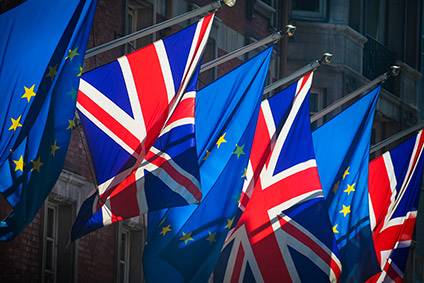
UK shoppers face the prospect of a hike in prices of staple products from meat to cheese if there is no Brexit deal with the European Union come the end of the transition period in December, retailers have warned.
The British Retail Consortium (BRC) has calculated the price of beef, which is imported in large quantities from the Republic of Ireland, will increase by 48%, while the cost of cheddar cheese is expected to rise by 57%, according to a report from the trade association.

Discover B2B Marketing That Performs
Combine business intelligence and editorial excellence to reach engaged professionals across 36 leading media platforms.
In the eventuality of a no-deal Brexit, the BRC said consumers should be aware the prices of “ordinary household goods that every consumer has to buy and replenish” is likely to increase.
Oranges from Spain will cost 12% more, while the price of cucumbers will rise by 16%.
Whether the UK secures a deal or not, new trading regimes are to come into force from 1 January, when the country exits the single market and the customs union, meaning customs and health checks on imports at borders.
“A good deal with the EU that avoids both new tariffs and large new costs on imported products is in the interest of all consumers,” said Aodhán Connolly, the director of the Northern Ireland Retail Consortium. “Without it, prices will increase as it is impossible for retailers to change sourcing to avoid them, particularly before January 2021. Also, it doesn’t rule out future trade deals with other countries, the benefits of which could be a reduction in current tariffs, working through into price reductions for UK consumers.”

US Tariffs are shifting - will you react or anticipate?
Don’t let policy changes catch you off guard. Stay proactive with real-time data and expert analysis.
By GlobalDataAbout half of all the food in restaurants or shops comes from the EU, with 30% of produce in supermarkets originating from the trading bloc, according to the BRC.
Connolly said in a Brexit press briefing: “It’s not foie gras that we’re talking about, it’s mince, it’s cheese, it’s oranges, you know. It doesn’t matter whether it’s Great Britain, or it’s Northern Ireland, the people who will suffer most because of these cost rises will be those people who are most economically vulnerable.”
Connolly added that it was a misunderstanding to think that retailers and their suppliers had built up “huge Brexit war chests.”
“A zero-tariff and effective regulatory deal with the EU is the best possible outcome for consumers and must be the top priority – the EU is the most important source of food imports where tariffs are highest,” said Connolly. “Achieving a UK-EU deal capable of being implemented in January 2021 is essential but time is running out.”
He continued: “We need a deal which also keeps the impact of new regulatory checks and increased red tape (from non-tariff barriers) as low as possible to ensure maximum choice, availability and quality for consumers, while not increasing prices.”





